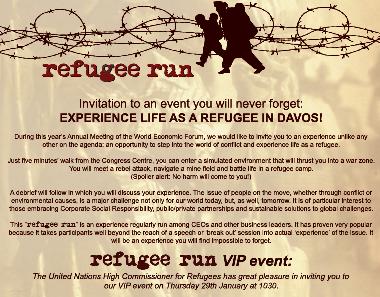Aid Watch Rerun: And Now For Something Completely Different: Davos Features “Refugee Run”
When somebody sent me this invitation from Antonio Guterres, the UN High Commissioner for Refugees, I thought at first it was a joke from the Onion. What do you think of the Davos rich and powerful going through the “Refugee Run” theme park re-enactment of life in a refugee camp?
Can Davos man empathize with refugees when he or she is not in danger and is going back to a luxury banquet and hotel room afterwards? Isn’t this just a tad different from the life of an actual refugee, at risk of all too real rape, murder, hunger, and disease?
Did the words “insensitive,” “dehumanizing,” or “disrespectful” (not to mention “ludicrous”) ever come up in discussing the plans for “Refugee Run”?
I hope such bad taste does not reflect some inability in UNHCR to see refugees as real people with their own dignity and rights.
Of course, I understand that there were good intentions here, that you really want rich people to have a consciousness of tragedies elsewhere in the world, and mobilize help for the victims. However, I think a Refugee Theme Park crosses a line that should not be crossed. Sensationalizing and dehumanizing and patronizing results in bad aid policy – if you have little respect for the dignity of individuals you are trying to help, you are not going to give THEM much say in what THEY want and need, and how you can help THEM help themselves?
Unfortunately, sensationalizing, patronizing, and dehumanizing attitudes are a real ongoing issue in foreign aid. David Rieff in his great book A Bed For the Night talks about how humanitarian agencies universally picture children in their publicity campaigns, as if the parents of these children are irrelevant. A classic Rieff quote: “There are two groups of people who like to be photographed with children: dictators and aid officials.”
Former World Bank President Wolfowitz with a few children
Alex de Waal in his equally great book Famine Crimes (and continuing writings since) writes about “disaster pornography.” He gives an example of a Western television producer in Somalia in 1992-93 who said to a local Somali doctor: “pick the children who are most severely malnourished” and bring them to be photographed.
Here’s a resolution to be proposed at Davos: we rich people hereby recognize each and every citizen of the globe as an individual with their own human dignity equal to our own, regardless of their poverty or refugee status. And Davos man: please give Refugee Run a pass.
 From Aid to Equality
From Aid to Equality



